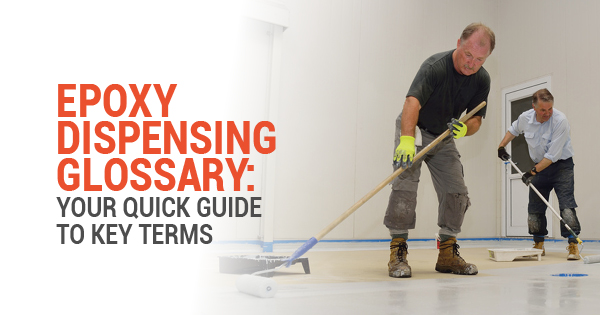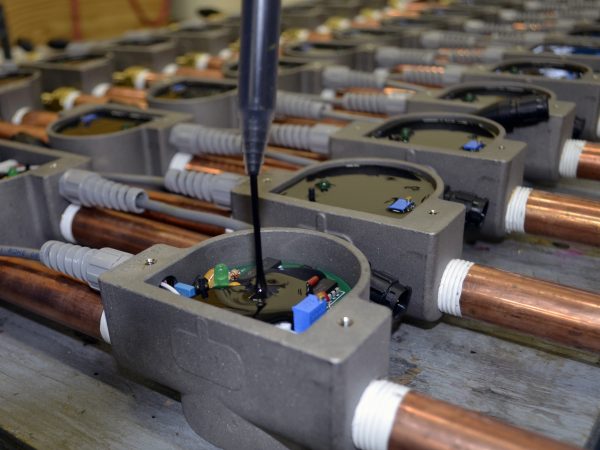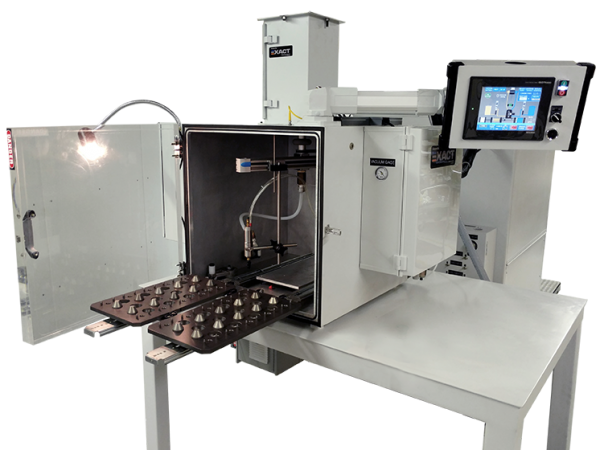
If your organization relies on epoxy dispensing equipment to make your products, it’s likely you already have a good working knowledge of the process. But if you’re new to the game, need a refresher, or want to expand upon what you already know, this quick glossary may be a great place to start.
A-Stage: During the reaction process of thermosetting resins, this early stage refers to the period in which the material is fusible and is still soluble (in certain liquids).
Adhesive: A material that can stick to or hold materials together via surface attachment.
Adhesive Dispensing Machine: Adhesive dispensing systems are devices used to apply bonding materials and to mix, meter, and dispense adhesives.
B-Stage: The intermediate stage of the thermosetting resin process in which the material will soften when heated or swell during contact with certain liquids, but may not fuse or dissolve entirely.
Bond Strength: The amount of tension, force, pressure, or impact required to separate adhered material from its base.
C-Stage: The final stage during the reaction of thermosetting resins, wherein the material is infusible and insoluble; a fully cured resin.
Catalyst: A material that starts or speeds up a reaction (i.e., an adhesive cure) but does not enter into the reaction itself.
Cohesive Failure: When the internal affinity of a material to itself (cohesion) is broken under stress.
Dispensing Supplies: Products used to apply epoxy, such as syringes, needles, bottles, and meter mix equipment.
Encapsulation: The process of completely enclosing an article in a substance, also known as potting.
Epoxy Resin: A flexible resin, typically of a thermosetting variety, with a chemical structure based on ethylene oxide (also known as epoxy). Used in epoxy dispensing equipment.
Flexural Strength: A material’s ability to withstand failure as a result of bending.
Gel: A jelly-like phrase occurring during the transition from liquid to solid, wherein the epoxy has no strength and is soft and flexible.
Hardener: Substance(s) mixed with an epoxy resin or other polymer to aid or control the curing reaction (also known as a curing agent).
Izod Impact Strength: A measure of a material’s brittleness and the amount of force required to break a piece of plastic with a hammer or other similar impact. Tougher materials have higher izod impact strength rates than more fragile materials.
Mixing Ratio: The ideal amount of resin to hardener to achieve a material’s desired properties.
MMD: Short for meter mix dispensing equipment, these machines measures and mixes the right ratio of resin to hardener and dispenses the mixture.
Orange Peel: An uneven material service, named for its resemblance to the outer peel of a citrus fruit.
Pot Life: The period of working time that a two-component mixed material can be easily used at a specific temperature, expressed in minutes.
Resin: A substance of natural or synthetic origin that is structurally polymeric.
Set: To transform a liquid epoxy into its hardened (fixed) state via chemical or physical polymerization.
Shrinkage: A decrease in a material’s volume due to chemical or physical changes or the escape of volatile substances. For example, potting compounds will shrink as they cure, sometimes by as much as 2.3%.
Thermal Conductivity: A measure of a material’s ability to conduct heat (how rapid heat conduction occurs).
Viscosity: A measure of a fluid’s resistance to flow or the fluid’s internal friction, measured in centipoise.
Wetting: The process of impregnation (i.e., filling material voids) via a liquid; liquids with higher surface tensions result in wetting difficulties, which makes the use of specific additives necessary in some cases.
Want to become even more of an expert on epoxy dispensing equipment terms? Check out our full glossary or contact us today with any questions.





